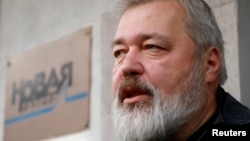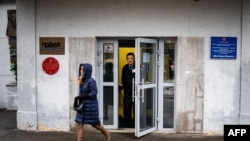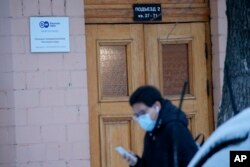Russia's Novaya Gazeta said on Monday it was suspending its online and print publications until the end of the war in Ukraine.
The decision comes after the independent media outlet, whose editor is the 2021 Nobel Peace Prize laureate Dmitry Muratov, received another warning from the Roskomnadzor media regulator.
"We are suspending the publication of the newspaper on our website, social media networks and in print until the end of the 'special operation on Ukraine's territory'," the newspaper wrote on its website, using Russia’s official terminology for its invasion of Ukraine.
Russian state news agencies reported that the regulator had issued Novaya Gazeta a second warning for failing to properly identify a nongovernmental organization deemed a "foreign agent" by the authorities in its publications.
The courts have power to close a media outlet if it receives two warnings in one year, according to Agence France-Presse.
Observers and media watchdogs see the move largely as retaliation for the newspaper’s reporting on the war in Ukraine, and for Muratov’s participation in an interview with Ukrainian President Volodymyr Zelenskyy on Sunday.
Roskomnadzor issued a warning to media to not use the interview between Zelenskyy and Russian journalists.
In a message to readers, Muratov said the decision to halt the paper’s activities was difficult but necessary.
“There is no other choice,” the note said. “For us, and I know, for you, it's an awful and difficult decision.”
Novaya Gazeta has been one of the last bastions of free press in Russia, said the New York-based Committee to Protect Journalists (CPJ).
“In their attempt to quash all independent coverage of the war in Ukraine, Russian authorities have closed down or otherwise silenced independent media outlets and have forced journalists to flee from prosecution,” said CPJ’s Europe and Central Asia Program Coordinator Gulnoza Said.
“Russia’s draconian censorship tactics must stop. Now more than ever, it is critical that Russian news outlets be allowed to provide unbiased coverage. Novaya Gazeta must be allowed to operate freely,” she said in a statement shared with VOA.
Moscow has severely curtailed how Russian media can cover the conflict, passing a new law that carries 15-year prison terms for reporting “false news” on the military and issuing directives on how to describe the conflict.
Russian authorities earlier this month ordered two other independent broadcasters, Ekho Moskvy radio and Dozhd TV, to be taken off the air and their websites to be blocked.
Blocking access
Russia’s Justice Ministry on Monday labeled the German broadcaster Deutsche Welle (DW) as a foreign agent.
In a statement, the broadcaster’s director-general Peter Limbourg said the move would not stop DW from providing independent coverage of Russia.
Noting that Russian authorities had already forced DW’s offices to close in Moscow and blocked access to its website, Limbourg said the latest action was not unexpected.
“It is a further attack on press freedom and a fresh attempt to cut the Russian population off from free, independent media,” Limbourg said.
Access to several other news websites and broadcasters, including VOA’s Russian service, are blocked in the country.
One of those, the Azerbaijani news website Oxu.az, was blocked in Russia on March 24.
Ulvi Safarov, Oxu.az’s editor-in-chief, said Russian authorities didn’t inform them about the decision to block the website.
“When the news regarding the Russian invasion of Ukraine is presented to the public in a manner not suitable to their interests, they block that website,” he told VOA in an interview on Monday.
“This is not about distortion of information or bias of taking one side over another,” Safarov said, adding that his website publishes “news in an unbiased and objective manner.”
“It is unacceptable to block the dissemination of unbiased news. This also amounts to Russia blocking its own population’s access to free information.”
Since the Russian invasion on February 24, several Azerbaijan-based websites have been blocked in Russia, including Haqqin.az, Virtual.az, Minval.az, and Musavat.com due to their coverage of the Ukraine war.
Azerbaijan's Press Council issued a statement on Monday denouncing the actions.
“Russia openly demonstrates disregard for freedom expression and pluralism. This is an indifferent approach to the internationally adopted principles and norms, as well as universal values,” the statement said.
“It amounts to limiting the Russian society’s ability to obtain objective information and to reach correct conclusion by familiarizing itself with an alternative thought,” the statement added.
Azerbaijan itself has a poor record on press freedom. The U.S.-funded Radio Free Europe/Radio Liberty (RFE/RL) and the Azerbaijani Meydan TV were both blocked starting in 2017.
Azerbaijan ranks 167 out of 180 countries in the 2021 World Press Freedom index, with 1 being the freest.
Some information in this report came from Reuters. VOA’s Azeri service reporter Tapdig Farhadoglu contributed to this report.







